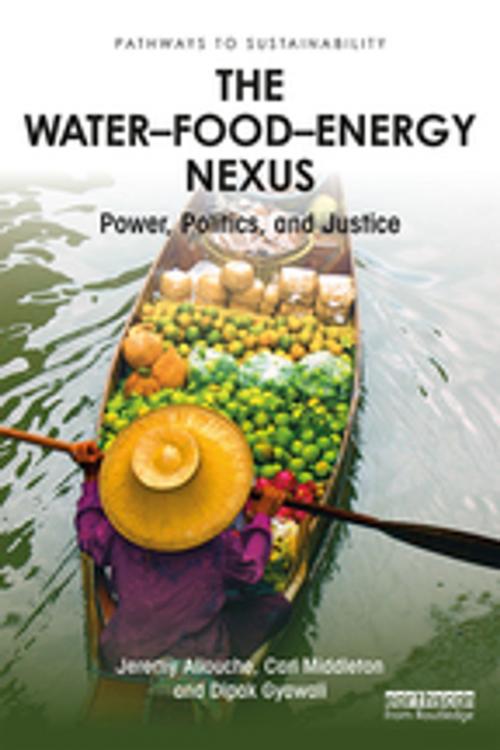The Water–Food–Energy Nexus
Power, Politics, and Justice
Business & Finance, Economics, Sustainable Development, Nonfiction, Science & Nature, Nature, Environment, Ecology, Social & Cultural Studies, Political Science, Government, Public Policy| Author: | Jeremy Allouche, Carl Middleton, Dipak Gyawali | ISBN: | 9781351805520 |
| Publisher: | Taylor and Francis | Publication: | April 9, 2019 |
| Imprint: | Routledge | Language: | English |
| Author: | Jeremy Allouche, Carl Middleton, Dipak Gyawali |
| ISBN: | 9781351805520 |
| Publisher: | Taylor and Francis |
| Publication: | April 9, 2019 |
| Imprint: | Routledge |
| Language: | English |
The world of development thinkers and practitioners is abuzz with a new lexicon: the idea of "the nexus" between water, food, and energy which is intuitively compelling. It promises better integration of multiple sectoral elements, a better transition to greener economies, and sustainable development. However, there appears to be little agreement on its precise meaning, whether it only complements existing environmental governance approaches or how it can be enhanced in national contexts. One current approach to the nexus treats it as a risk and security matter while another treats it within economic rationality addressing externalities across sector. A third perspective acknowledges it as a fundamentally political process requiring negotiation amongst different actors with distinct perceptions, interests, and practices. This perspective highlights the fact that technical solutions for improving coherence within the nexus may have unintended and negative impacts in other policy areas, such as poverty alleviation and education.
The Water–Food–Energy Nexus: Power, Politics and Justice lays out the managerial-technical definitions of the nexus and challenges these conceptions by bringing to the forefront the politics of the nexus, around two key dimensions – a dynamic understanding of water–food–energy systems, and a normative positioning around nexus debates, in particular around social justice. The authors argue that a shift in nexus governance is required towards approaches where limits to control are acknowledged, and more reflexive/plural strategies adopted.
This book will be of interest to academic researchers, policy makers, and practitioners in the fields of international development studies, environmental politics, and science and technology studies, as well as international relations.
The world of development thinkers and practitioners is abuzz with a new lexicon: the idea of "the nexus" between water, food, and energy which is intuitively compelling. It promises better integration of multiple sectoral elements, a better transition to greener economies, and sustainable development. However, there appears to be little agreement on its precise meaning, whether it only complements existing environmental governance approaches or how it can be enhanced in national contexts. One current approach to the nexus treats it as a risk and security matter while another treats it within economic rationality addressing externalities across sector. A third perspective acknowledges it as a fundamentally political process requiring negotiation amongst different actors with distinct perceptions, interests, and practices. This perspective highlights the fact that technical solutions for improving coherence within the nexus may have unintended and negative impacts in other policy areas, such as poverty alleviation and education.
The Water–Food–Energy Nexus: Power, Politics and Justice lays out the managerial-technical definitions of the nexus and challenges these conceptions by bringing to the forefront the politics of the nexus, around two key dimensions – a dynamic understanding of water–food–energy systems, and a normative positioning around nexus debates, in particular around social justice. The authors argue that a shift in nexus governance is required towards approaches where limits to control are acknowledged, and more reflexive/plural strategies adopted.
This book will be of interest to academic researchers, policy makers, and practitioners in the fields of international development studies, environmental politics, and science and technology studies, as well as international relations.















